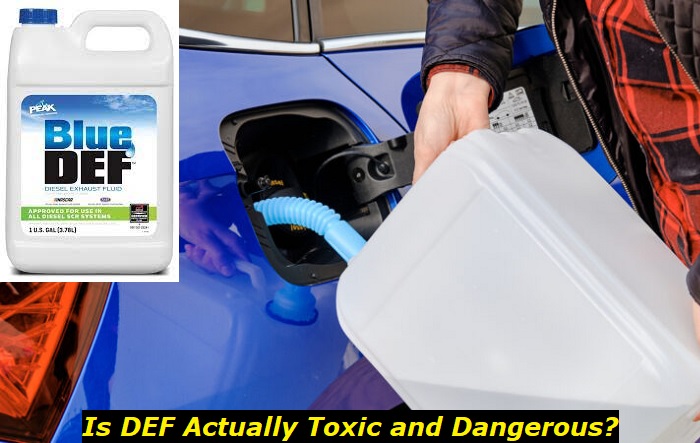Every diesel car now goes with a DEF injection system. It's not the fuel additive but a special substance that is injected directly into the exhaust. It doesn't burn or something. It just mixes with the exhaust gas and neutralizes several toxic elements found in the exhaust of a car or truck. DEF is now used in almost all kinds of transport including aviation, so not only diesel engines benefit from it.
But lots of people have a question whether DEF itself is harmful to the environment because this is a chemical product and it may influence some natural processes.
In short, DEF is not harmful to the environment. It's an environmentally neutral substance that consists of water and urea - both naturally occurring substances. These components can't harm nature, or kill living creatures unless they are treated unnaturally (you still shouldn't drink DEF or use it for watering your plants in the garden).

Let's see what we know about the environmental impact of DEF.
All kinds of risks with DEF explained
When DEF was first introduced in vehicles, drivers immediately became suspicious and thought that DEF will introduce them to new dangers like cars setting to fire, chemical skin burns, etc. I need to talk about each concern separately so that you wouldn't have any wrong perception of DEF and could safely use it without thinking that it's something bad.
Here are some of the possible dangers explained:
- Fire. DEF can't be ignited because it's not flammable. It won't burn even if you try to set it on fire. It consists mainly of water which is, as you probably know, not going to burn under any circumstances.
- Chemical impact on your skin. Another common concern is that DEF can lead to chemical burns when it comes in contact with the skin. But no, it's absolutely safe for your skin, urea doesn't cause any burns. Just wash your hands if some DEF got onto them.
- Toxicity for the environment. Although large amounts of DEF can slightly change the natural balance in the area, the substance won't harm the environment heavily. All components of the fluid are completely natural.
- Poisoning person. If you drink a liter of DEF, you may feel bad. But you won't die. DEF won't cause severe poisoning of the body even if you drink it but avoid this because it's basically the same as drinking urine.
- Causing corrosion in the exhaust system. There is no proof that DEF can accelerate the corrosion of exhaust pipes. It's injected into the hot exhaust and evaporated really quickly, so I don't think it will largely influence the condition of pipes and mufflers.
So, these are the most common concerns about DEF. I've also heard some exotic versions from truck drivers who apparently were conspiracy theory believers. They said that DEF is introduced in diesel cars for spraying some special chemicals all over the world to poison people, make them do what governments want, etc.
I really hope that my readers won't believe these exceptionally crazy theories and will always rely on common sense. DEF is not toxic or hazardous, it can't burn, and it won't cause any problems for nature or for the human body.
When can DEF be really dangerous?
There are basically three main situations when DEF can become dangerous for humans or for nature. Here they are:
- Mixing with oxidants. If you mix a large amount of urea or DEF with components like nitrites or chlorides, chances are that you will make a bomb or a highly flammable substance. But to make it dangerous, you will need thousands of liters of DEF.
- Drinking too much. If you drink several liters of DEF for some reason, the concentration of urea in your blood will become fatal and you may have several serious issues with your body. But you are still unlikely to die because of this if you get even minimal medical help.
- Eye irritation. If DEF gets on some sensitive areas of your body like eyes, it can irritate it. The irritation is easily solved with large amounts of clean water and washing your eyes. But it can be dangerous for some people who are allergic to many things.
Also, you shouldn't allow large amounts of DEF to get into the open nature. Once this happens, it may change the biological balance of the area. For example, DEF will eventually get into some river or lake and will boost algae blooming because urea is a wonderful fertilizer. This may lead to uncontrolled algae growth and will eventually kill the river. But this situation is rather fictional because I can't imagine dumping so much DEF into a river rather than selling it to diesel-car drivers.
Why DEF was only introduced to diesel cars recently?
Diesel cars weren't seen as a significant part of transport and technology that contaminates the planet badly. Although everyone knew they weren't really environmentally friendly, engineers had a lot of other work to do. DEF has been used for several decades now in diesel equipment. It's added to industrial exhaust, used in heavy equipment, and injected to exhaust in any equipment that burns diesel or some other types of fuels.
About 10 years ago, cat manufacturers started using DEF in vehicles and now it's the industry standard for any diesel car. So, the technology only started its way into cars because engineers had other tasks and used urea to help them reduce emissions of industrial units. Now it's turn for cars to lower their impact on the environment.
But you shouldn't think that DEF is now with us forever. I believe diesel engines are living their last years under the hoods of passenger cars. Probably, starting with 2025 or 2027 you won't be able to buy a new car in the US equipped with a diesel engine. The exception will only be with heavy-duty vehicles where the use of diesel engines is justified by their huge torque and low fuel consumption.
Can you prepare DEF on your own?
Now you know that DEF is not toxic or hazardous and you may think that you can actually avoid paying for DEF but prepare this mixture on your own. For this, you will need a lot of urea which still costs some money. So, basically DEF is two-thirds of clean water and one-third of chemically synthesized urea. But getting this kind of urea is not that easy.
Here are some complications that can show up if you want to prepare DEF on your own:
- buying clean and prepared urea is pretty hard and it may be expensive in the end;
- you will need a lab to mix everything because your modern vehicle won't like it if DEF is contaminated by something;
- you will need distilled water, so this adds to the cost of making your own DEF;
- it will take your time and usually, the money you save isn't worth spending that much time.
So, of course, you can prepare your own DEF and not pay gas stations and car part stores. But it isn't worth it. You will have quite a lot of problems including the need to get clean urea, clean water, and a place where you can safely mix everything.
It's always better to buy professionally prepared products that will offer high quality and good efficiency of work in the exhaust system of your vehicle.
What if I don't add DEF to my vehicle?
While in some older cars, it will be absolutely OK and you will be able to drive, the majority of modern diesel vehicles will just stop and refuse to go until you add some DEF. This is a huge problem for those who got used to gas engines where you only need to buy some gasoline.
So, don't forget that your vehicle consumes not only diesel fuel but also DEF. The average vehicle will take about 1 gallon of DEF for 300 miles. It's not a lot but you still should remember about this. If you are going to drive to long distance, you should have several canisters of DEF with you just in case you don't have any good gas station to buy DEF on your way.
This is what it takes now to own a diesel-powered vehicle. When the DEF tank is empty, you will get an error message saying that you urgently need some DEF. While some cars may just go to limp mode, other ones will command you to stop and turn off the engine.
Final thoughts
Adding DEF to your diesel-powered car is extremely important. Also, DEF is not toxic and not hazardous at all. It won't poison you under any circumstances (though I don't recommend drinking it anyway) and it won't cause much harm to nature even if it gets directly to the open environment in a limited amount.
I hope I answered all your questions about DEF and you've found all the needed answers. But if you still have some questions, please ask them in the comments and I will try to answer them or find a person who can do that better.
About the authors
The CarAraC research team is composed of seasoned auto mechanics and automotive industry professionals, including individuals with advanced degrees and certifications in their field. Our team members boast prestigious credentials, reflecting their extensive knowledge and skills. These qualifications include: IMI: Institute of the Motor Industry, ASE-Certified Master Automobile Technicians; Coventry University, Graduate of MA in Automotive Journalism; Politecnico di Torino, Italy, MS Automotive Engineering; Ss. Cyril and Methodius University in Skopje, Mechanical University in Skopje; TOC Automotive College; DHA Suffa University, Department of Mechanical Engineering






Add comment